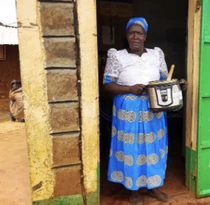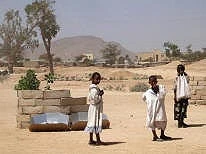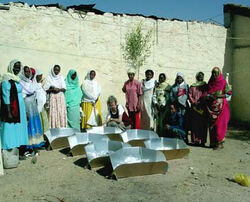Ben Hedrick (talk | contribs) mNo edit summary |
Paul Hedrick (talk | contribs) (Adding categories) |
||
| (5 intermediate revisions by one other user not shown) | |||
| Line 3: | Line 3: | ||
{{Updated|5|23|10}} |
{{Updated|5|23|10}} |
||
==Events== |
==Events== |
||
| + | {{CalendarAndPastEvents}} |
||
| − | See [[Calendar of events]] |
||
| + | |||
==News and Recent Developments== |
==News and Recent Developments== |
||
[[Image:Nahom_Nigussie_March_2007.jpg|right|75px]] |
[[Image:Nahom_Nigussie_March_2007.jpg|right|75px]] |
||
| − | *'''March 2007:''' Nahom Nigussie of Eritrea writes that he made a solar box cooker based on the instructions sent to him by Solar Cookers International. "I cooked rice, sauce and shiro (traditional pea sauce) within two hours, and one hour for tea. I expect it will cook better in shorter time during summer. … It is fascinating to look at the food cooked by sun. The fascination of making and using solar cookers also lies in its freely available source of energy — the sun." |
+ | *'''March 2007:''' Nahom Nigussie of Eritrea writes that he made a solar box cooker based on the instructions sent to him by [[Solar Cookers International]]. "I cooked [[rice]], sauce and shiro (traditional pea sauce) within two hours, and one hour for tea. I expect it will cook better in shorter time during summer. … It is fascinating to look at the food cooked by sun. The fascination of making and using solar cookers also lies in its freely available source of energy — the sun." |
[[Image:Eritrea.jpg|right]] |
[[Image:Eritrea.jpg|right]] |
||
| Line 22: | Line 23: | ||
''[Information for this section was taken originally from [[Media:sam.pdf|State of the Art of Solar Cooking]] by Dr. [[Barbara Knudson]]]'' |
''[Information for this section was taken originally from [[Media:sam.pdf|State of the Art of Solar Cooking]] by Dr. [[Barbara Knudson]]]'' |
||
| + | {{ArchivedPagesForHistory}} |
||
| − | |||
| − | ===See also=== |
||
| − | *[[Commons:Atlas of {{PAGENAME}}|Wikimedia Commons Atlas of {{PAGENAME}}]] |
||
==Climate, Culture, and Special Considerations== |
==Climate, Culture, and Special Considerations== |
||
| Line 40: | Line 39: | ||
===Articles in the media=== |
===Articles in the media=== |
||
===Web pages=== |
===Web pages=== |
||
| − | ==Audio and video== |
+ | ===Audio and video=== |
{| |
{| |
||
|- |
|- |
||
| Line 58: | Line 57: | ||
[[Category:Countries]] |
[[Category:Countries]] |
||
[[Category:Arabic-speaking countries]] |
[[Category:Arabic-speaking countries]] |
||
| + | [[Category:Countries with the greatest solar cooking potential]] |
||
| + | [[Category:Eritrea]] |
||
Revision as of 17:50, 5 February 2015
|
Last edited: 23 May 2010
|
Events
Featured international events
- 4-6 June 2024 (Bridgetown, Barbados): Sustainable Energy for All Global Forum - The event will be co-hosted by Sustainable Energy for All (SEforALL) and the government of Barbados. It is a platform for government, business and finance leaders, entrepreneurs, and youth and community representatives from around the world to come together to broker new partnerships, spur new investment, and address challenges at the nexus of energy, climate, and development. More information...
Online events
- NEW: Thursday, 18 April 2024 (2:30pm-3:15pm EDT), (Washington, D.C., USA): ESMAP Spring Meetings Knowledge Café: Clean Cooking at the Heart of Energy Access - Join ESMAP for this exciting knowledge-sharing opportunity, which will showcase the role of clean cooking as a key part of energy access and energy transition. Presentations by René van Hell, Director of Inclusive Growth, Ministry of Foreign Affair, Netherlands, Dr. Kandeh Yumkella Chairman, Presidential Initiative on Climate, Renewable Energy and Food Security, Sierra Leone, and Chandrasekar Govindarajalu, Practice Manager, ESMAP, World Bank. In-person attendance at World Bank Atrium, MC Front Lobby is for Spring Meetings registrants only. However, you can watch the event online
Requests for proposal
- Decentralized Renewable Energy Solutions utilizing Solar and Bio-Energy - Sustainable Energy Technologies and Assessments of ScienceDirect, is requesting guest-author submissions. The special issue, VSI: DRES is devoted to publishing research articles reporting the innovative designs and design interventions in solar thermal and bio-energy for decentralized energy systems (DES). It includes i) new and novel designs of prototype or commercial devices and technologies, their development, modeling and simulations and experimental validation; ii) innovations for processes, techniques, utilization, and applications; iii) novel use of materials for improving efficiency, performance, techno-economic feasibility, and sustainability and iv) research findings addressing the socio-economic, health and safety impacts, and life cycle assessments leading to proposing novel devices for DES. The Deadline for submission is 31 July 2024. More submittal information...
- See also: Global Calendar of Events and past events in Eritrea
News and Recent Developments
- March 2007: Nahom Nigussie of Eritrea writes that he made a solar box cooker based on the instructions sent to him by Solar Cookers International. "I cooked rice, sauce and shiro (traditional pea sauce) within two hours, and one hour for tea. I expect it will cook better in shorter time during summer. … It is fascinating to look at the food cooked by sun. The fascination of making and using solar cookers also lies in its freely available source of energy — the sun."
- March 2006: The Eritrea solar cooker project organized by the foundation Solar Cooking Eritrea Netherlands (SCEN) continues to spread solar cooking knowledge in the Anseba region. As of January 2006, women from eight villages in the region, who previously purchased CooKits, attend monthly classes to further their skills and work through any issues. SCEN hopes to extend these classes to 32 more villages in the region by the end of 2006. Local women are fabricating CooKits in the city of Keren. One hundred CooKits have been made, and more are in the works (pending re-supply of aluminum foil, which must be imported). According to SCEN representative Janine Pater, local fabrication is important: “This is a major step forward in accomplishing the objective that now, and in the future, everyone in Anseba will be in a position to buy and/or make a CooKit without restriction.” Contact: Solar Cooking Eritrea Netherlands
- November 2005: An Eritrea solar cooker project organized by the foundation Solar Cooking Eritrea Netherlands (SCEN) recently edged out 300 nominees to win an award for small-scale development projects. The award, presented by Dutch organizations the National Committee for International Cooperation and Sustainable Development (NCDO) and the Wild Geese Foundation, carries a monetary value of nearly $6,000. SCEN won based on project quality, thoroughness of the organization, efficient working methods, financial transparency, and the "for women, by women" aspect of the project. This year SCEN hopes to enable 4,500 families to solar cook with simple panel-type solar cookers based on Solar Cookers International's "CooKit." Thus far, 1,500 women have been trained, of which 700 have purchased CooKits for about $3.50 each. A new project coordinator, appointed by the National Union of Eritrean Women (NUEW), will organize future workshops and follow-up activities, and supervise a store where solar cookers are produced and sold. Project beneficiaries include low-income women in the Anseba region, and internally displaced persons in the Gash Barka zone. SCEN chairwoman Clara Thomas is currently organizing follow-up meetings with new solar cooks to collect feedback and discuss challenges and success. According to Ms. Thomas, evaluation and adaptation are essential. "In this way," she says, "a tradition of thousands of years of firewood cooking can be transformed to solar cooking with purely the sun as heat source." At least one woman in the Hagaz village seems already convinced. Of her experiences thus far, she says, "We prepare goat, rice, lentils and shiro in the CooKit and the taste is excellent!"
The History of Solar Cooking in Eritrea
In this nation, not long ago formed as an independent state following a long war with Ethiopia, an organization known as A.K. Lilu Alternative Energy Research has been in touch with Solar Cookers International. The founders are inventors and manufacturers of solar cookers in that new nation. Little else is however known about their sales or programs.
Participants in the 2001 Shell Oil sponsored electronic dialogue on household energy and health were informed that the Department of Energy of Eritrea had* however, engaged in a project promoting the use of fuel efficient stoves in that year. Studies had shown the inefficiencies of traditional bread baking methods and the loss of energy in charcoal making, as well. Therefore, what appears to have been a successful program to change long held habits had been instituted in a pilot area, then expanded to a larger number of villages, auguring well for promotion of additional renewable technologies.
[Information for this section was taken originally from State of the Art of Solar Cooking by Dr. Barbara Knudson]
- Main article: History of solar cooking
Archived articles
Climate, Culture, and Special Considerations
Solar Cookers International has rated Eritrea as the #23 country in the world in terms of solar cooking potential (See: The 25 countries with the most solar cooking potential). The estimated number of people in Eritrea with fuel scarcity but ample sun in 2020 is 1,900,000.
See also
- Discussion of eastern Africa's suitability for solar cooking
- Solar cooker dissemination and cultural variables
Resources
Construction plans in Arabic
- CooKit
- CooKit variation (made from smaller pieces of cardboard)
- Minimum Box Cooker
- Solar Water Pasteurizer
Reports
Articles in the media
Web pages
Audio and video
| Local Fabrication of the Cookit in Africa, Eritrea |

|
Cooking with the sun |
Contacts
The entities listed below are either based in Eritrea, or have established solar cooking projects there:
SCI Associates
- Main article: Solar Cookers International Association





